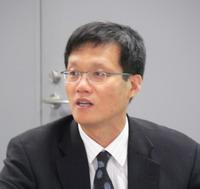
Changyong Rhee, secretary-general of the Presidenttial Committee for the G20 Summit, wants more measures to help emerging countries during crisis times.
BEIJING - South Korea, which will host the November meeting of the Group of 20 (G20) leading economies in Seoul, will push for an agreement on a global financial safety net that would help developing countries ward off external shocks, a top summit official said on Thursday.The new safety net would be within the framework of existing financial institutions such as the International Monetary Fund (IMF) and would help in rebalancing the global economy, said Changyong Rhee, secretary-general of the Presidential Committee for the G20 Summit.
Rhee, the former vice-chairman of the Korean Financial Services Commission, the nation's top financial regulator, told China Daily that the safety net would act as an anchor mechanism that would provide liquidity during times of external crises to those countries who do not have too many internal problems.
When a crisis happens, global investors often panic and withdraw capital from the financial markets of emerging economies even if the economic fundamentals are sound, he said.
South Korea was a victim of the irrational capital outflow stampede during the 2008 global financial crisis.
"Large financial institutions, especially foreign firms, started to withdraw capital from our stock market (when the crisis hit)," said Rhee. "The sudden reversal of capital flows aggravated the situation."
South Korea had about $240 billion worth of foreign exchange reserves in 2008. That, according to Rhee, was enough to tide over the crisis without any external assistance. "We were confident that we could sustain our economy for a year," he said. But investors did not believe us.
What really helped us was the Chinese central bank's currency swap and the US Federal Reserve's credit swap during the crisis times, said Rhee.
"Even though the swap was not that large, the gesture itself signaled that South Korea has no internal problems," he said.
It is important to institutionalize these kinds of actions as it will help the world respond more quickly and effectively to crises in other emerging economies with sound fundamentals.
"What we are proposing is to make financial institutions like the IMF do a similar job for the world, like the US Federal Reserve and China's central bank did for us," he said.
If there is no such mechanism in place, emerging countries will have only self-interest motivations and continue to accumulate foreign exchange reserves, he said.
Developed countries have often accused developing economies of piling up excessive reserves and causing global economic imbalances.
Rhee expects that the safety net mechanism would be materialized and made applicable at the November summit.
The summit, together with the June Toronto summit, would discuss issues like global macroeconomic policy coordination, sustainable growth, financial regulatory reform and reform of the governance structure of the World Bank and IMF.
The World Bank has increased the voting power of developing countries by 3.13 percentage points in late April, bringing it to 47.19 percent. But the IMF is yet to initiate similar reforms.
Rhee admitted that the progress has been slow and said "it still has a long way to go".





